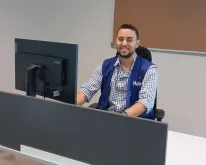In crisis contexts, we often hear about first responders on the frontlines. However, there are many others involved in longer term recovery. First responders and other humanitarian teams build local capacity, deliver aid safely and reach communities hardest hit by crises, including the COVID-19 pandemic. One example comes from Lebanon, where humanitarian volunteers are supporting the delivery of the World Food Programme (WFP).
This year, thirty UN Volunteers have been deployed in support of WFP operations in the Arab States. Of these, 23 have served in Lebanon, taking up roles in monitoring and evaluation, risk assessment, nutrition, public information and programme support.
UN Volunteer Jad Bayram is an Operational Information Management and Performance Reporting Officer. He contributes to knowledge products, including situation reports, country briefs, fact sheets and annual reports.
Jad communicates frequently with his WFP colleagues, collecting, condensing and integrating data related to both programme results and operational challenges. This constant communication has been essential, because it enables real-time reporting, thus ensuring that WFP is up-to-date on any changes that could impact its activities.
Real-time data is crucial. Lebanon has endured longstanding political instability, a severe economic recession, constant power outages and a recent widespread fuel shortage. As a consequence, many people don’t have transportation to reach food markets and are unable to refrigerate food in homes due to a limited power supply.
In addition, the COVID-19 pandemic and Port of Beirut explosion have claimed lives, increased unemployment and destroyed homes and businesses. Alongside social distancing, lockdowns and other measures aimed to contain the pandemic, these crises have also decreased commercial activities and narrowed the supply and distribution of basic necessities, such as food.
On the frontlines, humanitarian teams are working with people who are displaced and on the go, as well as others who are isolated at home, with no way to leave.
Because of the crisis, it is hard to be well here. Food is not a luxury and when it is inaccessible, you really understand how life-saving WFP's work is and how nimble the humanitarian system has to be. --UN Volunteer Jad Bayram, Operational Information Management and Performance Reporting Officer with WFP, Lebanon
Real-time reports help WFP refine, adapt and expand targeted interventions. They inform frontline operations, ensuring first responders know where to go and how best to respond.
Information and compliance reporting also supports local partners. UN Volunteer Rouba Zebian is a Risk Management and Compliance Assistant, also serving with WFP. Rouba reports on programme performance and delivers anti-corruption training, which helps local organizations safeguard resources.
The nature and urgency of humanitarian needs change often, creating risks that leaders have to address in order to increase food security. For example, inflation has increased the cost of food more than 400 per cent in the last two years, while government subsidies have been rescinded. Therefore, Rouba maintains a risk register that leaders leverage to identify, assess, rate, monitor and decrease these risks, for a programme that includes over 1.2 million people, most of whom have no other source of support.
We have to adapt, as well as innovate. We track safety issues, market value and other conditions which could accelerate vulnerabilities and necessitate more outreach and support to promote food security. In this evolving context, we are helping leaders anticipate the hurdles ahead of time. --UN Volunteer Rouba Zebian, Risk and Compliance Assistant with WFP, Lebanon
For World Food Day, we raise awareness about the food crisis in Lebanon and appeal for support to aid recovery. Yet, we also celebrate heroes like Rouba, who says, “Conditions here are severe, affecting every aspect of daily life. But, we stand fast. We don't leave.”

